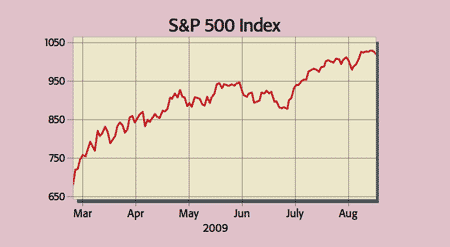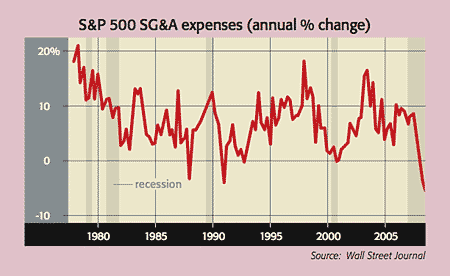Get the latest financial news, insights and expert analysis from our award-winning MoneyWeek team, to help you understand what really matters when it comes to your finances.
You are now subscribed
Your newsletter sign-up was successful
Want to add more newsletters?

Twice daily
MoneyWeek
Get the latest financial news, insights and expert analysis from our award-winning MoneyWeek team, to help you understand what really matters when it comes to your finances.

Four times a week
Look After My Bills
Sign up to our free money-saving newsletter, filled with the latest news and expert advice to help you find the best tips and deals for managing your bills. Start saving today!
So much for selling in May. British shareholders have enjoyed their biggest summer gains in 25 years, and the FTSE 100's 40% advance since March marks its best six-month run in 50 years. America's S&P 500 index has gained 50%. But the boom is unlikely to last. Markets "have decoupled from reality", says FAZ.net.
The pattern so far has been that risky, cyclical stocks have left solid defensive stocks, such as utilities, standing. Industrial metals and mining stocks geared to the economy have been among the top performers internationally, as Tim Price of PFP Wealth Management points out in the FT, while firms with dodgy balance sheets have outperformed the rest of the market.
Financials have outperformed too. In America, Citigroup has risen four-fold off its March low, while in Britain the combined equity value of the three biggest banks Lloyds, Barclays and Royal Bank of Scotland is just 15% below the average level of 2007, says Jonathan Pierce of Credit Suisse.
MoneyWeek
Subscribe to MoneyWeek today and get your first six magazine issues absolutely FREE

Sign up to Money Morning
Don't miss the latest investment and personal finances news, market analysis, plus money-saving tips with our free twice-daily newsletter
Don't miss the latest investment and personal finances news, market analysis, plus money-saving tips with our free twice-daily newsletter
Market optimism is running rampant, with Merrill Lynch's monthly survey of global fund managers revealing that more managers are swapping cash for shares, says Morgan Housel on Fool.co.uk. Cash balances have fallen to an average of 3.5%, and 34% of managers are overweight equities, the lowest and highest figures respectively since 2007. But investors are ignoring inconvenient truths. Take US earnings, says David Rosenberg of Gluskin Sheff.

Analysts are now pencilling in year-on-year, third-quarter earnings of 20.6%, a downgrade from April's forecast of 17.2%. "The notion that earnings are improving is not exactly supported by the facts." (See below for more.)
Neither is investors' apparent confidence in a rapid economic recovery. The improvement seen so far has been underpinned by unprecedented fiscal and monetary easing. "As long as economic growth relies on the state, you cannot talk about a durable recovery," says the European Central Bank's Yves Mersch. Battered banks hoarding cash and companies and consumers paying down debt don't exactly presage an "effortless" rebound either, says Price.
Yet investors are evidently hoping for a return to the pre-credit-crunch days. "A lot of people are now counting on everything to go right," agrees Housel. And "that's a scenario more likely to end in tears than triumph" with the economy this fragile.
The big picture: US earnings a mirage
Second-quarter S&P 500 earnings may have exceeded reduced expectations, but year-on-year profits were still down by around 28%. And as Tom Lauricella says in The Wall Street Journal, the results were driven by unprecedented reductions in overhead costs.

Selling, general and administrative expenses (SG&A), such as salaries and travel and advertising costs, fell by an annual 6.4% in the second quarter, compared to 4.1% in the 1991 recession and just 0.2% in 2001.
Sustainable profit growth requires sales growth, but with unemployment mounting and consumers retrenching, that's a tall order.
Get the latest financial news, insights and expert analysis from our award-winning MoneyWeek team, to help you understand what really matters when it comes to your finances.
MoneyWeek is written by a team of experienced and award-winning journalists, plus expert columnists. As well as daily digital news and features, MoneyWeek also publishes a weekly magazine, covering investing and personal finance. From share tips, pensions, gold to practical investment tips - we provide a round-up to help you make money and keep it.
-
 Should you buy an active ETF?
Should you buy an active ETF?ETFs are often mischaracterised as passive products, but they can be a convenient way to add active management to your portfolio
-
 Power up your pension before 5 April – easy ways to save before the tax year end
Power up your pension before 5 April – easy ways to save before the tax year endWith the end of the tax year looming, pension savers currently have a window to review and maximise what’s going into their retirement funds – we look at how

